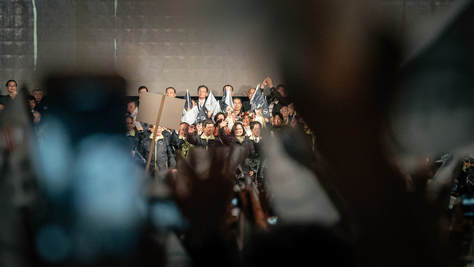
I'll have some more thoughts on the election results and what they mean later this week. For now, I want to revisit what I wrote in advance of the 2018 local elections for Taiwan Insight, with five questions for election night. How did things turn out?
Uh, no. This result was just about the worst of all plausible outcomes for the DPP given the state of the race in the last week. Going in I thought it more likely than not that Lin Chia-lung would come up short in Taichung, but losing 57-43% is on the low end of what was possible. I also expected the DPP's traditional partisan advantage in Kaohsiung to carry Chen Chi-mai through despite the Han Kuo-yu hype, so Han's 54%-45% margin of victory is just incredible. Losing both those races alone probably sealed Tsai Ing-wen's fate as party chairwoman, but then the DPP also lost winnable races in Chiayi City, Taitung, Changhua, and Yunlin, and only won with 38% in Tainan (!!); given the magnitude of the defeat I don't see how she could have stayed on. President Tsai is, indeed, now facing a much more precarious path to reelection in 2020.
2. Can the KMT Finally Get Its Act Together Again?
Close enough. This was, undoubtedly, a great night for the party and a vindication of sorts for chairman Wu Den-yi. The KMT's candidates won in Chiayi City, Hsinchu County, Taitung County, and Kinmen despite the presence of renegade pan-blue candidates, and it pulled off convincing wins in the special municipalities of New Taipei, Taichung, and Kaohsiung. On the down side, in Taipei, Ting Shou-chung didn't do any better against Ko Wen-je than Lien Sheng-wen did in 2014, and he fell just short of winning a three-way race, continuing the KMT's rather surprising recent weakness in the capital city. So Ko will remain in the spotlight and can potentially complicate any KMT challenge for the presidency in 2020 if he decides to run. Also, the jockeying for the KMT's presidential nomination in 2020 just got more complicated: in addition to Wu, Han Kuo-yu's rapid ascent has thrust him into the conversation, and Eric Chu, Wang Jin-pyng, and even former President Ma Ying-jeou kept high profiles during the closing days of the campaign. With Tsai and the DPP looking more vulnerable than most observers expected they would, the value of heading the KMT ticket in 2020 just jumped.
3. How Many Councilor Seats Can Third Parties Win?
Not many. The one small party to have some success in the local council races was the New Power Party (NPP), which won 16 seats around the island and has established itself more firmly than ever as the third party in the party system, after the DPP and KMT. But it fell short of the 20 it was aiming for, and it will still hold less than two percent of all council seats. The other old small parties fared quite a bit worse and appear to be in terminal decline: the PFP managed to win eight seats, the TSU five, and the New Party only two. The much bigger story was the resilience of the KMT in local races: it reversed a long decline in local councils and picked up eight seats this cycle. It will now form a majority in nine councils, including Kaohsiung. Rather than a realignment or breakup of the party system, this election suggests that the DPP-KMT duopoly remains entrenched. Much like in 2014 and 2016, when public opinion swings against the ruling party, the primary opposition rather than third party candidates is the main beneficiary.
4. What Happens if a Referendum Actually Passes?
We're about to find out: seven did, including the two anti-LGBT measures that directly conflict with the Council of Grand Justices ruling in 2017. The only one that will take direct effect is the elimination of the nuclear phase-out amendment to the Electricity Act passed by the DPP in 2016, because it overturns an existing law. All the others will require additional action by the executive or legislature, and it's not clear what will happen if the government doesn't act.
5. Can Taiwan's Election Management System Hold Up under Pressure?
Barely. Despite similar turnout to 2014, there were long lines to vote in many precincts--unusual for Taiwan. The inclusion of 10 referendums really put the Central Election Commission under strain: it had to decide which referendum questions were legal to put on the ballot, to verify signatures, to design procedures for 18-19 year olds to vote (but only for referendums!), and to count an unprecedentedly large number of ballots.
 RSS Feed
RSS Feed
